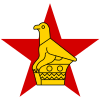Kingdom of Butua
Kingdom of Butua Butua | |||||||||
|---|---|---|---|---|---|---|---|---|---|
| c. 1450–1683 | |||||||||
| Status | Kingdom | ||||||||
| Capital | Khami | ||||||||
| Common languages | iKalanga | ||||||||
| Religion | Belief in Mwari | ||||||||
| Government | Monarchy | ||||||||
| Mambo | |||||||||
| History | |||||||||
• Established | c. 1450 | ||||||||
• Conquest by Rozwi Empire | 1683 | ||||||||
| |||||||||
| History of Zimbabwe | ||||||||||||||||||||||||||||||||||||||||||
|---|---|---|---|---|---|---|---|---|---|---|---|---|---|---|---|---|---|---|---|---|---|---|---|---|---|---|---|---|---|---|---|---|---|---|---|---|---|---|---|---|---|---|
 | ||||||||||||||||||||||||||||||||||||||||||
Ancient history
|
||||||||||||||||||||||||||||||||||||||||||
White settlement pre-1923
|
||||||||||||||||||||||||||||||||||||||||||
The Kingdom of Butua or Butwa (c. 1450–1683) was a pre-colonial African state located in what is now southwestern Zimbabwe. Butua was renowned as the source of gold for Arab and Portuguese traders. The region was first mentioned in Portuguese records in 1512.
The kingdom was governed by the Torwa dynasty until 1683 from its capital at Khami. In 1683, the kingdom was conquered by the Rozwi Empire.
The foundations of the Khami Ruins show a striking resemblance to the pattern of masonry at the base of the Zimbabwe Ruins.
History
[edit]Foundation and apogee
[edit]Khami was originally a Leopard's Kopje site, whose inhabitants are thought to be the ancestors of the Kalanga (southwestern Shona).[1]: 50 During the time of Great Zimbabwe's dominance over the region, various offshoots split from it to form various states. One such dynasty was the Torwa dynasty, presumed to have been Kalanga, who founded a kingdom centred on Khami. Its territory was rich in gold and cattle.[2]
The kingdom bordered the Mutapa Empire along the Sanyati River.[a][2] The first written record of Butua was from Ahmad ibn Majid in 1502, who mentioned "Munhu Butua" ("King of Butua").[1]: 49
Demise
[edit]The Portuguese invaded Butua in the 17th century and installed a puppet as king, however their influence over the kingdom was short-lived. The 1680s saw the rise of Changamire Dombo as his reputation as a sorcerer and military successes won him followers. In 1683 he conquered the Torwa Kingdom of Butua. His dynasty continued to rule in Butua, adopting the name "Rosvi", until it was destroyed during the 1830s amid the Ngoni invasions.[2]
Society and culture
[edit]After Changamire's conquest of Butua, the Rozvi did not allow the Portuguese to enter its territory, however they allowed African merchants hired by the Portuguese, termed mussambazes, to trade in Butua.[2]
Economy
[edit]This section is empty. You can help by adding to it. (February 2025) |
Gallery
[edit]-
The ruins of Khami, capital of the Butua Kingdom.
-
Steps leading into the ancient city of Khami
-
The outer wall of Khami
See also
[edit]Notes
[edit]References
[edit]- ^ a b Waarden, Catrien Van (2012). Butua and the End of an Era: The Effect of the Collapse of the Kalanga State on Ordinary Citizens : an Analysis of Behaviour Under Stress. Archaeopress. ISBN 978-1-4073-1019-0.
- ^ a b c d Newitt, Malyn (24 May 2018), "Southern Zambezia States and Indian Ocean Trade, 1450–1900", Oxford Research Encyclopedia of African History, doi:10.1093/acrefore/9780190277734.001.0001/acrefore-9780190277734-e-289, ISBN 978-0-19-027773-4, retrieved 18 February 2025
- ^ Waarden, Catrien Van (2012). Butua and the End of an Era: The Effect of the Collapse of the Kalanga State on Ordinary Citizens : an Analysis of Behaviour Under Stress. Archaeopress. ISBN 978-1-4073-1019-0.
- Gwinn, Robert; Norton, Peter; Goetz, Philip (1989). The New Encyclopædia Britannica. Vol. 2. Encyclopædia Britannica, Inc. p. 689. ISBN 0-85229-493-X.
- Shillington, Kevin (2004). Encyclopedia of African History, Vol. 1. London: Routledge. pp. 1912 Pages. ISBN 1-57958-245-1.



